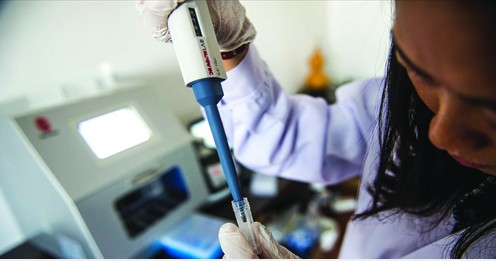 |
| A geneticist scrutinizes saliva samples and analyzes a report about a customer's condition. Photos: Li Hao/GT |
Individualizing treatment
Zhao said getting an original DNA sample from a subject isn't as important as analyzing the sample itself, even if it comes from a relative.
Customers genetically tested with 360 Gene are given reports on their results that offer a thorough analysis of their body and its functionality, Zhao said.
"Customers are given an electronic report with five categories of information: drug metabolism, individual genetic characteristics, dietary environment, carrier status for congenial diseases and genetic resistance against common diseases," she said.
The company offers customers readings on traits genes show, such as an individual's ability to absorb nutrients.
Folic acid (FA) is a common supplement doctors advise mothers-to-be to take during pregnancy, but not everyone can absorb it well. Zhao said genetic testing her company has carried out has determined four levels of FA absorbance.
"You need to know these kinds of characteristics about your body in order to make appropriate changes to your diet or medication," Zhao said. "If you learn through genetic testing that you can't absorb FA well, you might need to increase your dosage of it with your doctor's approval."
There's comforting news for people who struggle to lose weight no matter how much they exercise or diet, with Zhao claiming body shapes are largely determined by our DNA.
"Your genes decide where you will have extra fat," Zhao said. "Some people might not look fat, but they have high levels of blood lipids."
In hospitals, genetic testing is used to better prevent, diagnose and treat diseases, said Ye Qing, chief doctor of the pathology department at the Drum Tower Hospital.
"Genetic testing actually detects mutations in body cells, which are related to certain diseases," she said. "For example, the epidermal growth factor receptor (EGFR) gene can be the main reason for lung cancer when it mutates."
Ye confirmed that people found with certain gene mutations, like Jolie, are more likely to be at risk of certain diseases in the future. Fortunately, genetic testing can pave the way for earlier diagnosis and treatment, thus saving more lives.
After genes have been decoded, individual plans can also be developed based on DNA analyses.
Liu Baorui, chairman of the oncology department at the Drum Tower Hospital, said in the tumor treatment field drugs are being developed to target the characteristics of certain genes.
"For example, there's a type of medicine called TKI for non-small-cell lung cancer. The medicine works best if the EGFR gene mutation is detected in tutor tissues. In this case, its effectiveness can be as high as 80 percent. But if the gene doesn't mutate, then the effectiveness of the medicine can be as low as 1 percent."
Known as gene-targeted drugs, these medications are being used for patients with cancer of the lung, stomach or intestine, Liu said.
Doctors who devised treatment plans in the past usually relied on trial and error and isolated prescribed medication to one drug at a time.
Such treatment plans can be ineffective and slow, Ye said, noting it can mean the difference between life and death for a terminally ill patient.


 Fire guts 22-storey Nigeria commercial building in Lagos
Fire guts 22-storey Nigeria commercial building in Lagos U.S. Navy Carrier Strike Group stages military exercises
U.S. Navy Carrier Strike Group stages military exercises Volkswagen showcases new energy vehicles in Beijing
Volkswagen showcases new energy vehicles in Beijing  How should we get married nowadays?
How should we get married nowadays?  Commentary:
Commentary: Jakie Chan sees Rubber Duck off in Beijing
Jakie Chan sees Rubber Duck off in Beijing Hello! Horror Halloween Celebration!
Hello! Horror Halloween Celebration!  The catwalk to the world of fashion
The catwalk to the world of fashion  Cruise trip to Taiwan
Cruise trip to Taiwan  Unveil PLA air force base
Unveil PLA air force base  Say goodbye to tube-like apartment building
Say goodbye to tube-like apartment building Oriental education or western education?
Oriental education or western education? China in autumn: Kingdom of red and golden
China in autumn: Kingdom of red and golden National Geographic Traveler Photo Contest
National Geographic Traveler Photo Contest Chinese screen goddesses from Beijing Film Academy
Chinese screen goddesses from Beijing Film Academy Day|Week|Month